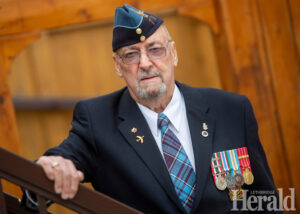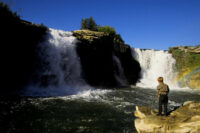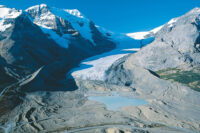Local veteran served on the front lines of the Cold War
By Herald on November 12, 2020.
 Retired Royal Canadian Air Force Warrant Officer Jim McGrath served through much of the Cold War era. Herald photo by Ian Martens
@IMartensHerald
Retired Royal Canadian Air Force Warrant Officer Jim McGrath served through much of the Cold War era. Herald photo by Ian Martens
@IMartensHeraldTim Kalinowski
Lethbridge Herald
tkalinowski@lethbridgeherald.com
Not many of us could ever say we have handled a live nuclear bomb before, but for retired Royal Canadian Air Force W/O Jim McGrath it was a regular occurrence during the early 1960s.
McGrath specialized in heavy equipment transportation during his military career, which started in 1959 and extended until 1982 when he retired, and one of his first overseas postings was on the front lines of the Cold War in western Europe when tensions between the old Soviet Union and the NATO alliance were at their highest following the Cuban Missile Crisis.
“When I went to France and Germany we were under the nuclear arms race at that time; so we had (nuclear) bombs uploaded on aircraft at all times,” he remembers. “We were in a ready mode which entailed our extra caution as far as handling nuclear weapons. When the bomb would come in we were responsible to have it brought to the secure area where they loaded it up on the aircraft.
“When a bomb came in it would come in with an American Globemaster aircraft, and we would be responsible to load it on one of our low bed tractor trailers, and with a security detail was moved to its location where it was uploaded on the aircraft or secured,” McGrath recalls.
Armoured by youthful laissez-faire and a strong attentiveness to his duties, McGrath didn’t think much of it at the time as he carried out his bomb transport duties even as fears of global nuclear war grew around him.
“Paranoia was the theme of the day,” he acknowledges. “When you are younger you sort of take things in stride, and you don’t realize how dangerous things could have been or how touchy the situation really was … I think we just took it as a routine procedure in those days. We were trained and briefed on what we had to do, and it is like any other job: you do it and the danger level was relatively low unless there was an accident, and, of course, there are all kinds of safeguards put in place to protect you from accidents in them cases.”
McGrath says despite it being a regular part of his duties it never could be taken for granted.
“I think we are very fortunate things didn’t progress to the point where they (the bombs) would have to be used,” he says. “I think people maybe underestimate the danger at that time. The imminent danger of nuclear war was just around the corner, and fortunately cooler heads prevailed and nothing happened. We were on the brink of conflict at any time in those days.”
After his experiences McGrath went on to have a varied career serving on 11 different bases altogether from Europe, to the High Arctic to the Middle East.
While his Cold War experiences certainly had their intense moments, McGrath feels the most danger he ever faced in his career was serving as a U.N. Peacekeeper in the Middle East in wake of the Yom Kippur War fought between Israel on one side, and Egypt, Syria and Jordan on the other. When McGrath arrived for his six month tour in 1974 he found out Peacekeeping, in this case, was largely in name only as all sides still regularly fired on each other.
“I was just after the Egypt and Israel war,” he recalls. “We still had to have buffer zones to keep the sides separated. We also had buffer zones between Israel and Syria that we maintained too. We had checkpoints all over the place over there run by different U.N. countries. We also patrolled the area to keep the trouble down, and if there were an incident between different actors then we were responsible to go there and try to straighten the things out.
“I drove around a Chief Logistics Officer who was responsible for the whole area,” McGrath explains, “and was a very important position. He was the go-to guy if there were any incidents anywhere. We would go to Egypt, then to Israel, and then we would go to Lebanon, and then we would go over to Syria and Jordan, and then back. We would do that tour maybe weekly or biweekly checking on all the different factors to make sure everything was running smoothly.”
Much of the time McGrath and the officer would be making these trips at night.
“I felt very vulnerable,” he admits. “The Middle East was a powder keg in those days. When we travelled through the desert, I had a special pass because I was driving this VIP, but I had to night-travel. I was one of the only guys who was allowed to night-travel, and you would see the tracer (shells) going over your car. They had big Russian transports in there hauling tanks with no lights whatsoever. You would know they were coming when you’d feel the ground shaking. So you had to get off the road and make sure you were out of the way because they would just come ploughing through. If you were there, you would no longer be there.”
One major incident during his tour drove home to McGrath just how dangerous the U.N. operation was– when the U.N. Buffalo 461 aircraft was shot down by a Syrian missile by mistake on Aug. 9, 1974. All four Canadian crew members as well as five Canadian military passengers were killed in the incident.
“They shot down one of our Buffalo aircraft and killed all the people on it who were friends of mine,” remembers McGrath. “And all sides were still live-firing at some points. I was stationed on the Ismailia right on the Suez Canal. And they had gun emplacements there that when the Israeli aircraft would fly over they would still be firing at them. And then the whole area would be heavily mined. We had to travel through that area the whole time, and we had several of our people run over mines and they were either killed or had their lower extremities blown off.”
Despite hearing the stories from the old Second World War veterans who were still serving when he first joined the Air Force, it wasn’t until McGrath went on his Middle East Peacekeeping mission that he saw the full impacts of war.
“In those days the whole (Suez) canal was blocked,” he recalls. “They had sunk ships from one end to the other. Suez City was on one end and Port Said on the other end. There were only a handful of people living in either one of them then because of the war. Most of the people during the war had moved down into Cairo to get away from the bombing and the planes.”
After serving 23 years in the Canadian military, McGrath finally called it a career and moved permanently to Alberta where he worked as a driver examiner for the Government of Alberta until he retired altogether. Although raised in Nova Scotia, McGarth continues to call Lethbridge home. McGrath would just like to say to young people that they should seriously consider a career in the military to get a good start in life.
“I think the military is a great organization for young people,” he says. “It not only teaches you your trade, they teach you to look after yourself. Your hygienic standards are held to a high standard. You learn how to live with other people and get along with them. You are under constant training and supervision, and you learn from the older soldiers that have been around. “In my day when I joined up I served with a lot of the Second World War people who had been through the whole war and came back, and were still serving. It was a wonderful group of people, very dedicated, and they would take us young guys under their wing and pass their knowledge on to us. You can’t beat the camaraderie. Your friends in the military are a special group of friends– they are lifetime friends.”
Follow @TimKalHerald on Twitter
-1




